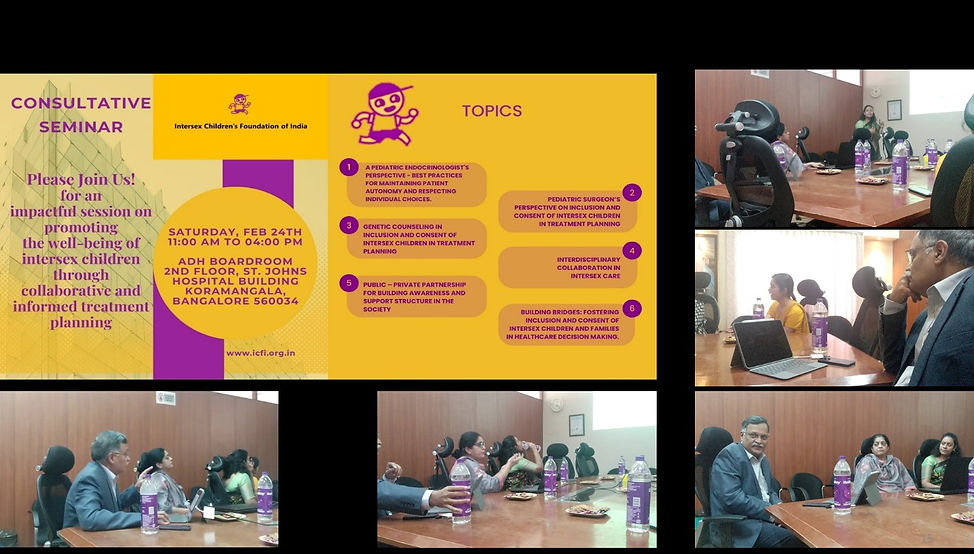Call Us : +91 85508 45550
Successful Collaboration and Advocacy Initiatives
Our initiatives in sensitization are curated to shape a society that not only possesses knowledge but also empathy towards the distinctive experiences of intersex children. Through carefully tailored participatory seminars/webinars ICFI is actively engaged in dispelling stereotypes and challenging misconceptions.

We are thrilled to announce the resounding success of our recent consultative webinar on Intersex Awareness, held on February 5th, 2024. This event, hosted by the Intersex Children's Foundation of India (ICFI), focused on exploring strategies and approaches for rearing intersex children, addressing critical issues facing this marginalized community.
Our heartfelt thanks to our esteemed speakers, whose invaluable contributions were instrumental in making the event a true success:
-
Dr. Kalpana Datta (Chatterjee) – Professor and Head of Department of Pediatrics, Director of Center of Excellence HIV Care, Medical College Kolkata
-
Dr. Shamik Ghosh – Senior Consultant Pediatrician specializing in Adolescent Health and Developmental Disorders, Bhagirathi Neotia Women and Child Care Centre, and Manipal Hospital Kolkata
-
Dr. Pankaj Singhania – Specialist in Endocrinology, practicing in Purulia, West Bengal
-
Dr. Dipanjana Datta – Consultant and Genetic Counselor, State Coordinator of Organization of Rare Diseases, India
-
Mx. Mohammed Ali – Molecular and Cellular Biologist, Research Fellow with Intersex Asia
-
Ms. Sudeshna Roy – Ex-Chairperson & Current Advisor of West Bengal Commission for Protection of Child Rights
The overwhelming response from participants underscores the collective desire for more such events, urging us to explore a wider range of topics. We're inspired by the appetite for dialogue and collaboration within our community. Particularly noteworthy was the appreciation for the inclusive space we created, enabling meaningful interactions between medical professionals and intersex individuals.
The success of this webinar reaffirms our commitment to hosting more frequent sessions, addressing diverse topics to educate, empower, and unite.

Thrilled to share the success of the impactful seminar hosted by the Intersex Children's Foundation of India!
Aligned with our mission to advocate for the rights of intersex children the seminar focused on the critical aspects of "Inclusion and Consent in Healthcare Planning for Intersex Children in India", from the perspective of Bharat's socio-cultural contexts.
We are obliged to our esteemed speakers, not only for their thought provoking presentations, but also for creating an interactive atmosphere for all participants.
Dr. Shubha A. M. - Professor & Head Pediatric Surgery, St. Johns Medical College Hospital
Dr. Sanjay Rao - Head of Pediatric Surgery, Narayana Health
Dr. Tejasvi Sheshadri - Senior Pediatric Endocrinologist, Sparsh Hospital
Dr. Gayatri Iyer - Scientist & Senior Genetic Counselor
Our amazing participants, with their enthusiasm and engagement, really encouraged us.
Let's continue the dialogue and work together towards a more inclusive and supportive future for intersex children in India
Publications
A Critical Review of DSD/Intersex Research in India & Recommendations for augmenting medical care protocols and practices
https://www.researchgate.net/publication/378567670_A_Critical_Review_of_DSDIntersex_Research_in_India_Recommendations_for_augmenting_medical_care_protocols_and_practices
This review encapsulates a critical examination of the historical clinical and etiological research on intersex conditions in India and acknowledging the progress made, it underscores the existing gaps and proposes constructive pathways for improvement. In the spirit of constructive engagement, we propose ideas for improvement to further enhance the impact of future research endeavors. The advocacy for increased longitudinal research aims to fill existing knowledge gaps, providing a more holistic understanding of the psychosexual impact of intersex conditions throughout an individual's life. Moreover, encouraging regional collaboration is put forth to ensure a more diverse and representative sample pool, capturing the rich cultural, social, and regional diversity within the Indian context. Comprehensive education programs are proposed to bridge the gap between research insights and societal attitudes, targeting healthcare professionals and the wider public.
Intersex/Differences of sex development: Human rights at the intersection of cure and care
https://www.researchgate.net/publication/362964226_IntersexDifferences_of_sex_development_Human_rights_at_the_intersection_of_cure_and_care
Intersex people are viewed from the medicalized lens of having a “disorder” of sex development rather than a difference in sex development. This inherent indifference to diversity is also visible in LGBTQIA+ advocacy, as they were initially excluded from the Yogyakarta Principles promoting the human rights of sexual and gender minorities. This paper attempts to explore the issues of discrimination, social exclusion, and unnecessary medical treatments through the lens of the Human Rights in Patient Care framework to advance the human rights of the intersex community and highlight the need for the state to take responsibility. The discussion touches upon intersex people’s right to bodily integrity; the right to freedom from torture and cruel, inhuman, and degrading treatment; the right to the highest attainable standard of health; and the right to legal and social recognition. The concept of human rights in patient care moves beyond the traditional philosophical principles of bioethics as it applies legal norms in a patient care context derived from judicial interpretations and international conventions upholding human rights at the intersection of cure and care. As socially accountable health professionals, we have to defend the human rights of intersex people who are marginalized within the marginalized community.



